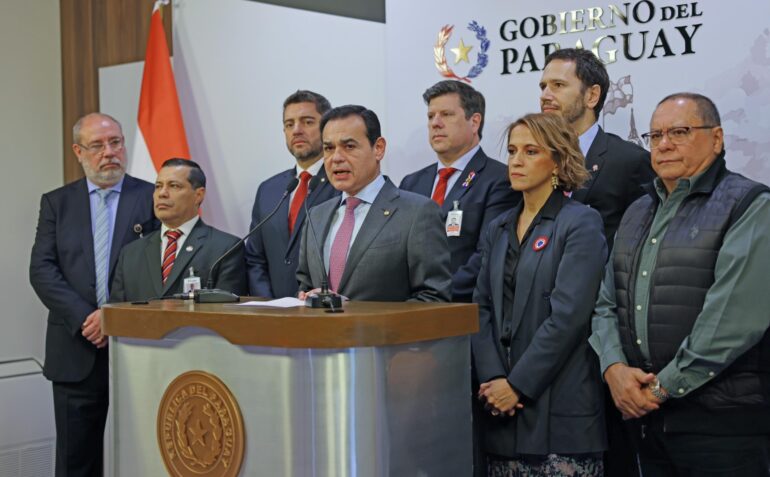Ministers of the Executive Branch today explained in a press conference the scope of the agreement reached with Brazil on the price of the Itaipu electricity tariff, which will run until 2026 and the basis for the negotiation of Annex C. They affirmed that this agreement opens a window for Paraguay to take a leap in its development process and to become a host for investments.
After the official announcement made by President Santiago Peña, Foreign Affairs Minister, Rubén Ramírez, led the press conference where they delved into explanations about the “historic agreement” reached with Brazil.
Ramírez explained that the most important aspects of the agreement include the establishment of a tariff for electric energy at 19.28 kW/month until 2026, the maintenance of the operational agreement of Itaipu, the immediate possibility for Paraguay to sell its share of unused power to the Brazilian free market, and the agreement to conclude the negotiation of Annex C of the binational entity this year.
The group of ministers said that the $1.25 billion in revenue that Paraguay will receive thanks to the established tariff would not disappear as a result of corruption. “These resources will be managed with honesty, transparency, and patriotism,” said Vice President of the Republic Pedro Alliana.
The Head of Cabinet of the Presidency of the Republic, Lea Giménez, reinforced that the use of those resources will be subject to “historical management in terms of transparency” and anticipated that mechanisms are being defined to ensure a use “that is effectively open to the citizenship, with full accountability.”
In his message to the country, President Peña announced that the $1.25 billion that Paraguay will receive annually until 2027 will be allocated to the creation of centers for promoting health, nutrition, and education for all children in Paraguay, national and citizen security, the construction of three large hospitals in the interior of the country, modernization of road and public transport infrastructure, and strengthening of energy infrastructure.
Short, medium, and long-term strategies
Along with investments in hospitals and road and transport infrastructure, a large part of those resources will be used to strengthen our capacity for electricity distribution and transmission, said Minister of Industry and Commerce Javier Giménez.
He highlighted that Paraguay’s negotiation strategy always had a short, medium, and long-term plan. For a brief period, Paraguay will continue to be an energy-exporting country, obtaining “unprecedented resources” and exporting to the Brazilian free market.
“The idea is that from 2027, Paraguay can consume its share of the energy generated in Itaipu, regardless of the tariff price established from that year, because by adding value to that tariff, it is multiplied by five or six. By not exporting that energy anymore and transforming it into finished products, that is the idea to industrialise Paraguay,” he said.

Foreign Affairs Minister Ramírez reinforced that Paraguay’s strategy for this negotiation included a transition period so that Paraguay “is not only an energy exporter but also a host for investments, using all the potential of the country and generating production, profitability, fair and sustainable employment, well-paid for all Paraguayans.”
In the same vein, the President of the National Electricity Administration, Félix Sosa, stated, “So far, it is convenient for us as Paraguay to have a higher tariff because Paraguay’s utilization percentage is still much lower than that of Brazil.”
“But by 2027, with a growth of approximately 12% per year, we would already be very close to using the power that corresponds to us from the Itaipu Binational,” he added.
He also clarified that ANDE’s customers “will not at any time have a tariff increase due to this increase” in the tariff since the additional approximately US$73 million in power purchases will be offset by the additional income now available to Itaipu.
The Head of Cabinet of the Presidency of the Republic and advisor to Itaipu, Lea Giménez, was keen to celebrate the new agreement and congratulate all those involved in the negotiations.
“It is a moment, in short, to celebrate. Since its construction, this has been the most important achievement of the Itaipu Binational Dam. The results for Paraguay are tremendously favorable, so we can celebrate calmly that this has been a success in terms of a negotiation where we worked hand in hand with our Brazilian brothers.”


